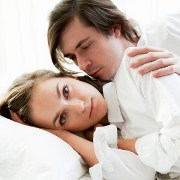"Could I use the restroom please?" my eyes searched frantically for the door that said 'Ladies' even as I asked for it.
"The hall way to your right, go all the way the ladies room is on the left."
I thanked him and made my way through the aisles trying not to bump into anything in my haste. By the time I reached the restroom I was almost about to explode. I twisted and turned and held my thighs close together as I struggled to free the belt and open the zipper of my jeans. I couldn't describe the relief and pleasure of unburdening my bladder at that moment. I breathed easily at last. I got up, flushed the toilet and put my zipper on and waited for a minute to see if I felt any sensation of my bladder wanting to go again. Sure enough it did and I unzipped my pants again and sat on the toilet again to make sure I was empty completely this time. I suffered with poor bladder control ever since I gave birth to my youngest son.
Urinary incontinence is defined as failure to control the urinary bladder muscles leading to uncontrollable flow of urine. In other words, loss of bladder control. There are several types of urinary incontinence including : stress incontinence, urge incontinence, mixed incontinence, functional incontinence, and over flow incontinence.
Stress incontinence is a temporary condition that could be the result of weakened urethral muscles. People with this condition suffer with leakage of urine or wetting clothes, during physical exercises or lifting heavy weights, during laughing, coughing, sneezing. This happens mainly due to the weakened sphincter muscles at the neck of the bladder that make the bladder to contract and control the flow of the urine. Physical therapy of the pelvic floor muscles to strengthen or restraining the urethral muscles are the treatment methods for the stress incontinence.
Urge incontinence is a condition where there is a sudden urge to urinate sometimes in a matter of seconds and losing control of the bladder. This mainly happens in women and elderly. A person suffering from this condition always feels like using the restroom, wakes up in the middle of the night with the sensation of the bladder, feels the urge to urinate when hearing the running water sounds or after drinking the water. Urge incontinence may be caused due to urinary tract infections, bowel problems, nerve damage, multiple sclerosis, Parkinson's disease and stroke among others. An overactive bladder and weakened bladder muscle is the main reason for this condition. Prostate problems and removal of the prostate gland could cause this problem in males. For women it could be because multiple child births or menopause. Treatment methods include exercises of the urethral muscles and medicines for this condition.
Mixed incontinence is as the name suggests a mixture of urge and stress incontinence together.
Functional incontinence is the condition of elderly or patients who cannot move from their beds.
Over flow incontinence is a constant dribbling of the urine with the inability to empty the bladder at one time or completely. This could be because of anatomical defects, surgeries of the spine or bladder, or abnormal opening of the sphincter of the bladder and other adjacent structures.
While it is embarrassing to have to use the restroom frequently like me, it is also harmful to hold it back that could lead to urinary tract infections for most people. There are adult diapers available in the markets for people who could not control their bladder at all. Drinking less water while traveling or before traveling in areas that lack public restrooms is advisable. Avoiding drinking water after seven or eight in the night time will help in emptying the bladder once before going to bed and helps us get sound sleep all through the night. For diabetics keeping the blood sugar levels under control will help control frequent urination and prevent complications of the bladder and kidneys. Simple steps do help people with urinary incontinence lead a normal life without being conscious about their problem and enjoy their times out of the house, because OUR LIFE MATTERS.



Add a CommentComments
There are no comments yet. Be the first one and get the conversation started!